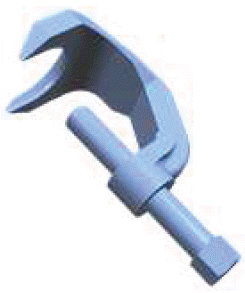Buick Regal: Description and Operation
REAR SUSPENSION DESCRIPTION AND OPERATION
The rear suspension system on this vehicle is of the independent link type. Rear suspension adjustment is achieved through adjustable toe links and lower control arms. The rear coil springs are retained between the body and the lower control arm. Rubber insulators isolate the coil spring at both top and bottom. The rear suspension consists of 2 shock absorbers attached to the lower control arm and the reinforced body areas.
The rear suspension system performs the following functions:
- Maintains the relationship of the rear axle to the body
- Controls the torque reaction on acceleration and braking
The suspension system consists of the following components:
- Support assembly
- Coil springs and insulators
- Stabilizer shaft, insulators and stabilizer links
- Toe adjust links
- Upper lateral links
- Lower control arms
- Trailing arms
- Knuckles
- Wheel bearing/hub
- Shock absorbers
SPECIAL TOOLS AND EQUIPMENT
SPECIAL TOOLS
CH-43631
J-43631
Ball Joint Remover

READ NEXT:
 Suspension General Diagnosis
Suspension General Diagnosis
SPECIFICATIONS
TRIM HEIGHT SPECIFICATIONS
Trim Height Specifications (P-R Height) - Hatchback
NOTE: For 0% option vehicles add 1 mm to front and rear suspension
values.
For 100% option vehicles subt
 Tire Pressure Monitoring System
Tire Pressure Monitoring System
SPECIFICATIONS
FASTENER SPECIFICATIONS
Reusable Threaded Fastener Tightening Specifications
NOTE:
All fasteners listed in this table can be reused after removal.
SEE MORE:
 DTC B125B
DTC B125B
Diagnostic Instructions
Perform the Diagnostic System Check - Vehicle prior to using this
diagnostic procedure.
Review Strategy Based Diagnosis for an overview of the diagnostic
approach.
Refer to Diagnostic Procedure Instructions for an overview of each
diagnostic category.
DTC Descripto
 Selecting the Right Engine Oil
Selecting the Right Engine Oil
Selecting the right engine oil
depends on both the proper oil
specification and viscosity grade.
Specification
Use full synthetic engine oils that
meet the dexos1 specification.
Engine oils that have been
approved by GM as meeting the
dexos1 specification are marked
with the dexos1 approved logo.
© 2019-2026 Copyright www.buregal6.com

